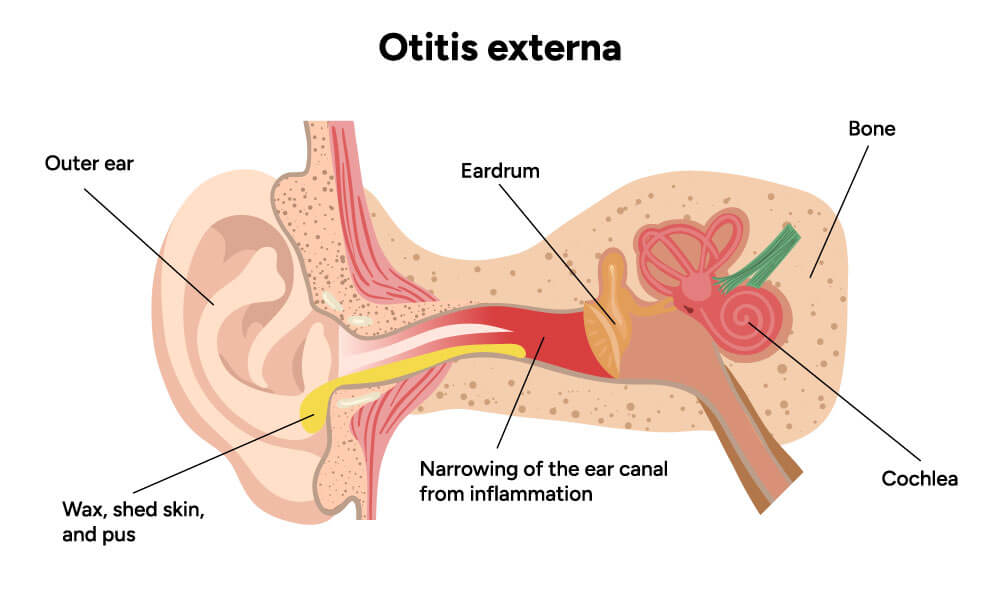Have you ever had a sense of fullness, fluid, or pressure in your ear? This can happen for seemingly no reason, and it’s uncomfortable to deal with.
It can feel like there’s fluid in your ear even if there’s no actual water inside. This is a common complaint that could have many different root causes.
If your symptoms persist, you should seek medical evaluation from a professional. In the meantime, knowledge is power. Learn more about ear pressure and fluid sensations.
Common Causes of the “Water in Ear” Sensation
Water in ears is less common than these alternative explanations. Although water can get trapped in the ear canal, the sensation is more often caused by a buildup or pressure of some kind.
Earwax Buildup
You have glands throughout your ear canals that produce a substance called cerumen, more commonly known as “earwax.”
Excess earwax production can cause blockages and buildups that trap moisture in your ears. This can lead to a “water-in-ear” feeling, even if there’s no actual water present.
When earwax blocks your ear canals, your ears might feel full, and noises might sound muffled. A professional earwax cleaning is your best bet to clear your ears and get rid of that fluid and pressure sensation.
Eustachian Tube Dysfunction (ETD)
Your eustachian tubes connect your middle ear to your throat. These tubes maintain appropriate pressure levels in your ears by draining fluids. When they don’t work properly, pressure and fluid can easily build up, causing muffled hearing and a sensation of ear fullness.
Middle Ear Infections (Otitis Media)
Your middle ear region contains your eardrum, which helps you hear properly. When the middle ear becomes infected, the space behind your eardrum swells, which can cause fluid accumulation and pressure.
Swimmer’s Ear (Otitis Externa)
In this case, the water-in-ear feeling is real, and water has become trapped in your ear canal after swimming. The trapped water often leads to an ear infection, which causes further inflammation and ear fullness.

Barometric Pressure Changes
If you’ve ever been on an airplane or elevator and felt your ears pop, you’ve experienced air pressure changes firsthand. Diving can also cause this problem. Altitude shifts affect the pressure balance in your inner ear, which often feels like fluid in ears that aren’t used to it.
Less Common But Serious Conditions to Be Aware Of
These culprits behind ear fullness and pressure are less common, but they require professional attention if they arise. Letting them go can make the pressure sensation worse and even cause long-term ear complications.
Inner Ear Disorders
Inner ear conditions like Ménière’s disease cause recurring bouts of ear fullness and feelings of fluid in the ear. Symptoms like dizziness and vertigo often come with them, since your inner ear is responsible for maintaining your balance.
TMJ Dysfunction
Your temporomandibular joint (TMJ) connects your jaw to your skull. TMJ disorders cause dysfunction of the joints you need to chew and talk, along with inflammation and ear pain. Jaw tension can mimic the feeling of fluid or fullness in your ears.
Perforated Eardrum
Ear infections, pressure changes, and other strains to your eardrum can cause a small hole to appear. A perforated eardrum often makes your ear feel “wet” and full of fluids.
Temporary hearing loss and muffled sounds are two common symptoms of a perforated eardrum. Most perforations heal on their own, but if these feelings persist, you should see a professional.
Associated Symptoms That May Accompany the Sensation
Along with a water-in-ear feeling, you might get other uncomfortable symptoms. While unpleasant, they offer clues about the underlying cause of your ear sensations.
Muffled hearing and temporary hearing loss most often indicate a perforated eardrum. Perforations frequently cause drainage of fluid and pus from your ear, so keep an eye out for that.
Popping sounds, clicking, and pressure are all common side effects of barometric pressure changes. When the air pressure around you changes rapidly (most often while flying or using an elevator), your ear pressure adjusts accordingly. This can lead to loud pops and clicks that end with your ears feeling full of fluid and extra pressure.
Dizziness and imbalance may come with your “it feels like water in my ear” sensation. This is because your inner ear helps your body maintain balance and proper positioning in space. Temporary vertigo and a spinning sensation are common partners to feeling fullness in your ears.
Finally, be on the lookout for sudden ear pain and discomfort. Pressure changes and fluid buildup can cause mild to moderate ear pain, which isn’t always a cause for immediate concern.
However, persistent and worsening pain isn’t normal. Always see a professional if your ear fullness and discomfort aren’t going away.
How Audiologists Diagnose the Cause
Audiologists are highly skilled professionals who can figure out the root cause of your water-in-ear sensation. They use special types of clinical exams to rule out common disorders and infections. From there, they can recommend the appropriate treatments for you.
An audiologist will typically use an otoscope to view your ear canal first. They’ll look for abnormalities in your eardrum and signs of inflammation in your ear canal. If you have earwax buildup, they can remove it and see if your symptoms improve.
Tympanometry is another important part of the diagnostic process. Your audiologist will measure how your eardrum responds to slight pressure changes using a special probe. Tympanometry exams can detect eardrum perforations, fluid buildup, and other eardrum abnormalities that might be causing your discomfort.
You’ll undergo a basic hearing test to see how pronounced your hearing loss is. In many cases, muffled hearing and temporary hearing loss go away when your underlying ear issue resolves.
If your audiologist can’t resolve things on their own, they’ll refer you to an ear, nose, and throat specialist (ENT). ENTs can perform additional imaging services and treat complex inner ear problems.
Personalized care is the key to an accurate ear diagnosis. If you’re tired of feeling pressure and fluid sensations in your ear, you should choose a reputable audiologist’s office for top-tier care.
What You Can Do About It
It’s tempting to try anything you can at home to get ear pain relief. Here’s what you should and shouldn’t do when suffering from ear fullness and pressure.
Do Not Insert Objects in Your Ear
Cotton swabs and other at-home wax removal methods can be dangerous to your ear health. You can accidentally push the swab too deep into your ear canal, causing damage to your eardrum and trapping the wax deeper inside.
If your hands or cotton swabs aren’t clean enough, you may also introduce bacteria into your inner ear, leading to a new or worsening infection. Avoid inserting anything into your ears.
Safe At-Home Remedies (if Appropriate)
If your ear pain is too much to handle, you can try using a warm compress to relieve pressure buildup.
This type of at-home remedy is typically safe and appropriate. However, your symptoms won’t always go away on their own. If your discomfort persists, see an audiologist for further support and diagnosis.
When Medical Treatment Is Needed
If you have an ear infection or struggle with severe ear anatomy dysfunction, you may need medical intervention. Ear infections usually require antibiotics, which are prescribed by physicians at urgent care facilities, emergency rooms, and primary care offices.
You can also use decongestants if your doctor recommends them. This can help clear out the drainage system in your ear and relieve some of the fluid buildup.
In severe cases, you may need surgical intervention to correct a badly perforated eardrum or other anatomical problem. An ENT can give you further guidance on this process.
Ongoing Care and Prevention
After you go swimming, you should gently dry out your ears with a soft cloth. Avoid putting your head underwater if you know you’re prone to swimmer’s ear.
Manage your seasonal allergies with an ENT or primary care physician to prevent congestion and fluid buildup in your ears. This may involve taking 24-hour allergy medication daily or more intense interventions.
Get regular ear and hearing checkups to ensure your ears are functioning at their best. Audiologists can catch new issues sooner than you might expect.
When to See a Hearing Specialist
You should immediately visit an audiologist if:
- Your ear pain has become unbearable
- Your hearing loss is getting progressively worse
- All sounds are muffled and hard to make out
- Your ears are leaking pus, blood, or other fluids
- You have dizziness and vertigo that comes and goes
- At-home remedies aren’t working for you
Leaving ear pain and fullness unaddressed can lead to more permanent consequences down the road. The last thing you want is to sustain hearing loss and damage from a treatable problem.
At Happy Ears Hearing Center, we provide comprehensive care with skilled audiologists who prioritize your hearing health. We can help with ear pressure, fluid buildup, and pain.
Don’t Ignore the Feeling — Get Relief Today
When you come to Happy Ears Hearing Center, you’re in great hands. We can diagnose and map out treatment plans for common ear problems that give you a water-in-ear sensation.
If you’re experiencing a persistent sensation of fluid in your ear, schedule an appointment with a Happy Ears audiologist today to get the answers — and relief — you need.
 Donate by November 25, 2024
Donate by November 25, 2024 

